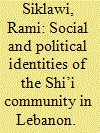|
|
|
Sort Order |
|
|
|
Items / Page
|
|
|
|
|
|
|
| Srl | Item |
| 1 |
ID:
135328


|
|
|
|
|
| Summary/Abstract |
Over-the-counter sale of medicines is endemic in Abu Dhabi, and all sorts of medicines can be purchased without the submission of a prescription (Yeboah, 2013). This study looks at the gender dimensions of the practice and examines the reasons given by pharmacists and their clients for the practice, emphasizing the specific differences between male and female respondents. The methodologies involve survey of pharmacists and their clients together with direct observation of the practice in selected pharmaceutical outlets. The results point to clear differences in the reasons given by male and female purchasers, but little to no differences in the reasons given by male and female pharmacists. The study concludes that both males and females are involved in the practice, albeit more male purchasers were observed buying the medicines.
|
|
|
|
|
|
|
|
|
|
|
|
|
|
|
|
| 2 |
ID:
135327


|
|
|
|
|
| Summary/Abstract |
Post-9/11 American neo-Orientalist representations pervade today’s politics and journalism about the Arab World. Since the first emergence of the Middle East representation in American writings of the nineteenth century, one can assume that nothing has changed in representations of the Middle East in the US. This article explores a twenty-first century phenomenon called “neo-Orientalism,” a style of representation that, while indebted to classical Orientalism, focuses on “othering” the Arab world with the exclusion of some geographic parts, such as India and Turkey, from the classical map of Orientalism. Although neo-Orientalism represents a shift in the selection of its subject and locale, it nonetheless reproduces certain repetitions of and conceptual continuities with its precursor. Like classical Orientalism, neo-Orientalism is a monolithic discourse based on binarism between the superior American values and the inferior Arab culture.
|
|
|
|
|
|
|
|
|
|
|
|
|
|
|
|
| 3 |
ID:
135325


|
|
|
|
|
| Summary/Abstract |
Since the early days of the Shi’i presence in Lebanon, the Shi’i community has been considered the most marginalized and underprivileged community. This had been the case of the Shi’ites during the Mamluk period, the Ottoman period, the French mandate period, and again during the post-independence period. This article addresses the Shi’ite presence in Lebanon until the eve of Lebanese Civil War (1975). The article will explore the various aspects of socio-political identities of the Shi’ites and how that changed and developed during the Ottoman period, the French mandate, and the independence period by elaborating on the main actors and processes/phases that shaped this change. It has been argued that the marginalization and the neglect policies that were applied against the Shi’ites opened the wide doors for the Shi’i community to migrate to the urban cities in Lebanon (mainly Beirut) starting from the late nineteenth and early twentieth century, and this had also been expanded to the rest of the world (mainly America and West Africa). This migration played a key role in developing their contemporary social and political identities in which Musa al-Sadr and his movement played an important part.
|
|
|
|
|
|
|
|
|
|
|
|
|
|
|
|
| 4 |
ID:
135329


|
|
|
| 5 |
ID:
135326


|
|
|
|
|
| Summary/Abstract |
This article sheds light on the development in the relationship between the Lebanese Maronite church and the French colonial authorities during the mid-1930s. It focuses on the confrontational stance of the church toward the French under the leadership of Patriarch Antoine ’Arida (1863-1955). I delineate ’Arida’s resistance to the imposition of the tobacco monopoly, the Régie, and his diplomatic and political maneuvers, culminating with the 1935 popular uprising against the French, which cut across Muslim and Christian lines. Through the analysis of French archival documents and reports, I argue that the deterioration in Maronite-French relations was primarily caused by the colonial mapping of Grand Liban and its disruptive consequences for Mount Lebanon’s leadership and economy. With the French imposition of the tobacco monopoly, the conflict took the form of a nationalist resistance against the French. Ultimately, the Maronite Church pursued a delicate balance between the interests of its parish and commitments to the French. The crisis sparked a critique of the French colonial logic, pushing the Maronite Church and the nationalist Lebanese elite to struggle for independence from the French.
|
|
|
|
|
|
|
|
|
|
|
|
|
|
|
|
|
|
|
|
|